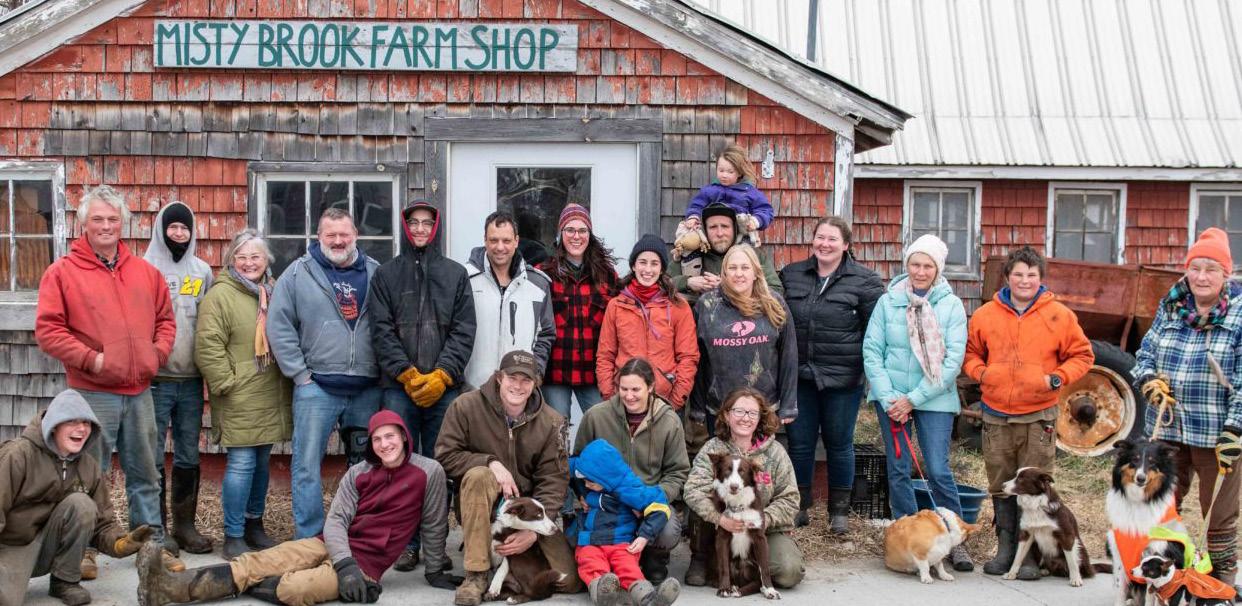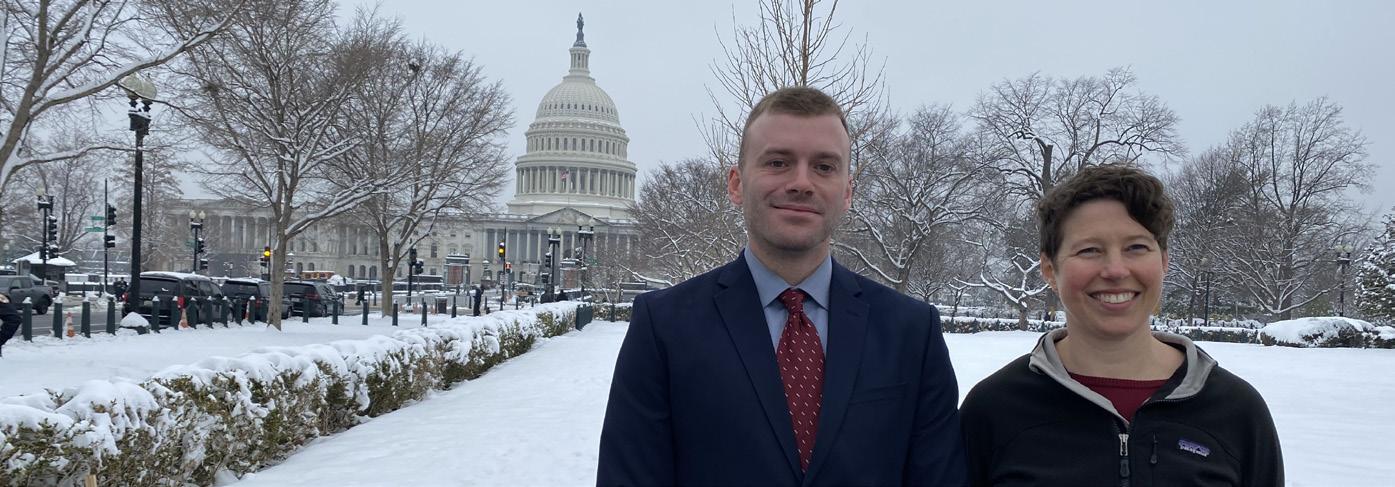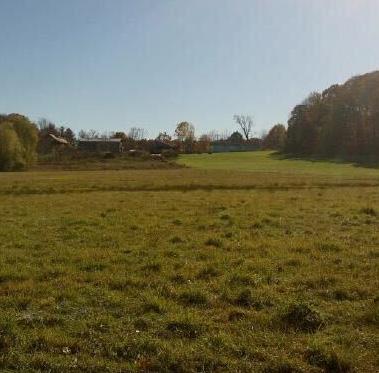Introducing MFT’s 2025 Implementation Award grantees
Misty Brook Farm, Albion
“We enjoyed meeting with the Farming for the Long Haul cohort and participating in classes together. It was helpful to write an updated business plan and we look forward to implementing it this year and into the future. MFT’s Implementation Grant will help us execute our plan to update our pig barn and put in a wood boiler to supply hot water and heat to multiple buildings on the farm.”
Old Crow Ranch, Durham
“Old Crow Ranch feels incredibly fortunate to be involved with Maine Farmland Trust. Starting with a livestock specific cohort of farmers, in it “for the long haul” in 2023 through rewriting our business plan (15 years into the business), and winning an Implementation Grant in 2025! It’s so exciting and uplifting!”
Second Frost Farm, Monroe
“Now more than ever we really appreciate this opportunity to access regional agricultural funding. We feel hopeful that this implementation grant investment will build key efficiencies and resiliencies into our farm business.”
photo credit: Kelsey Kobik
photo credit: @wildorchardstudios
photo credit: Andy Gagne Photography
A NOTE FROM MFT’S PRESIDENT & CEO STACY BRENNER
FARMER VOICES IN POLICY & ADVOCACY WORK
Since becoming MFT’s President & CEO, it’s been a time of thoughtful listening, learning, and considering, which has rooted me as we enter our five-year strategic planning process this year, with farmers, friends, staff, and Board coming together to articulate the vision for the next phase of MFT.
I love the idea generation and imagination that goes into planning for the future. One of our goals is for anyone who wants to farm to have access to the land needed to do so. Although it will take many years and much learning to see this vision fully realized, we’re deepening relationships with farmers and partners to lower the barriers that farmers face, and we’re continuing to work toward goals centered on farm viability, responsive farmer supports, and protecting farmland. It takes all of these pieces for agriculture in Maine to thrive –and deep listening to farmers is at the center.
Celebrating 25 years at MFT
In this newsletter, you’ll read about how farmers’ voices directly inform how we advocate for farms at the municipal, state, and federal level. And, we remain steadfast in advocating for farmers at the federal level, particularly in the face of cuts to important programming at the USDA. We know that it will take all of us – working arm-in-arm with farmers, partner organizations, policymakers, and the State – to make MFT’s vision for thriving farms and communities possible.
Kristin Varnum was hired just a few months after MFT was founded, and she has been instrumental in helping grow the organization and in shaping the work we do today. In the last 15+ years, Kristin has served as Vice President & Chief Financial Officer, as well as our Interim President & CEO, and her leadership and institutional knowledge have helped us navigate through organizational transitions, the pandemic, the PFAS crisis, and more. Kristin, thank you for all that you’ve done to help MFT grow into the dynamic, responsive organization we are today!
“What’s been most rewarding is seeing how MFT has remained farmer-centered, evolving in response to their needs while staying true to our mission. It’s inspiring to see how far we’ve come, though the work is never done.”
- Kristin Varnum
Farmer voices making change
When farmers participate in the policy process, it leads to better outcomes. That’s because farmers know best how policy ideas work on the ground, and by sharing their firsthand experiences and ideas on solutions, they are strong champions for a social, economic, and political environment that supports thriving, interconnected farms.
In 2024, we implemented a new branch of this work –a standing committee of farmers to help us strengthen the way that we engage farmers in policy and advocacy, centering farmers’ perspectives as we set priorities and advocate on behalf of Maine farms. Farmer Advocacy Committee members bring a range of policy priorities but all share an interest in engaging with us more deeply over the course of the year and building a future in which Maine’s farmland is protected and our farms can thrive.
2024 committee member Brendon Wormell of Wormell Farms in Cumberland visited Washington, D.C. this past winter to bring farmers’ thoughts and concerns directly to Maine lawmakers on Capitol Hill. He joined our Policy & Research Director Shelley Megquier to share the ways in which Maine farmers rely on federal programs, their concerns about potential cuts and funding freezes, and to ask Maine’s elected officials to fight for the programs that have the greatest positive impact for Maine farmers and farmland.
“I loved feeling connected to a group of other farmers who have goals in common. And having received positive feedback on our written testimony to the legislative sessions was very encouraging, it makes me feel confident and more likely to submit testimony again in the future.”
-Katie Clark, co-owner of Reed Farm, Windsor
2024 members:
• Penny Jordan Jordan’s Farm, Cape Elizabeth
• Andy Smith The Milkhouse, Monmouth
• Jim Buckle The Buckle Farm, Unity
• Katie Clark Reed Farm, Windsor
• Brendon Wormell Wormell Farms, Cumberland
• Erica Emery Rustic Roots Farm, Farmington
2025 members:
• Bill Spiller Spiller Farm, Wells
• Lindsey Neville New Dawns Farm, Mt. Chase
• Molly DellaRoman 5 Star Nursery and Orchard, Brooklin
• Brad Santy Santy Dairy, Skowhegan
• Angela Baglione Seek-No-Further Farmstead, Monroe
• Lane Moir Moir Farms, Woodland
Brendon Wormell and Shelley Megquier at the U.S. Capitol building
Staff and Board members at a recent strategic planning meeting
MFT’s Farmland Stewards visit protected farms every year to take note of field management, forestry projects, and other easement-related activity. Multiply that by the 305 farms currently stewarded by MFT, and that’s a lot of time spent on the road and in the field!
This spring MFT’s Stewardship Program Manager Hannah Chamberlain and Farmland Steward Robin Hackett got to fly in a 4-seater plane and take photos from (way far!) above using LightHawk, a non-profit that offers pro-bono flights in service of conservation goals.
From this new vantage point, they completed aerial monitoring of 18 conservation easements over a 150-mile span in just a couple of hours. This was a great opportunity to expedite the easement monitoring process for a wide region.
A day in the life of an MFT
Farmland Steward: on the road with with Emily McCarthy
Far beyond monitoring and assisting with adhering to the terms of an easement, MFT’s Farmland Stewards are in the field meeting with farmers on the daily, gathering feedback and insight from farmers about their experiences and challenges and connecting them to resources. Let’s ride passenger seat with Emily McCarthy on a typical farm stewardship visit.
It’s a wet May morning (there have been a few!) and you’re hitting the road at 8:00 a.m. What tools or gear are you never without? What’s always in your backseat?
When I’m heading out on a monitoring visit, I always have my phone, muck boots, and compass on hand. My phone is my biggest tool, as we use an application called Landscape to gather GIS data, photos, and notes from the visit. I’ll also be sure to have snacks or lunch on hand and keep a boot washing kit in the backseat to avoid potential cross-contamination of pests or disease between farms.
It’s 9:00 a.m. and you’re pulling down a dirt road for your first farm visit of the day. What’s on the agenda?
First, I’ll meet with the farmer! In most cases, this will be the first time we’ve seen each other since last year’s visit. It’s a great opportunity to check in and talk about the current growing season. After chatting about changes, plans
for the upcoming year, and any resources I can connect them with, I set up my Landscape map to track my route and set off on my walk around the farm.
When you meet with a farmer, what are the things most often on their minds?
Understandably, the weather is usually the biggest focus of our conversation. Whether there’s too much water or not enough, we often chat about how the weather is affecting their operations and what’s within the farmers’ control to harness positive impacts and mitigate negative outcomes. (These insights help inform the work of our Climate Resilience team, where I also spend part of my time.) Addtionally, farmers often share their observations related to changes in production costs, availability of farm labor, increases in solar development, and access to reliable infrastructure.
What’s a challenge you run into on any given day?
Ticks. Walking around hayfields and bushwhacking through woodlots make me a magnet, and I’ve pulled considerably more off of me this season than in previous years.
What was a recent win for a farm / farmer you got to witness?
This past year, a farm I work with successfully transferred operations from one generation to another, keeping the farm in the family’s ownership. This farm is a cornerstone of its community and will continue to provide its local customer base with fresh produce. As more Mainers age out of farming, it’s encouraging to see the next generation take the ropes and keep farms in production.
Farm-friendly communities
This spring 20+ farmers and municipal officials from seven Farmington-area communities joined MFT and the Greater Franklin Food Council for a conversation on farm-friendly municipal strategies. Farmers and town officials exchanged stories and perspectives and voiced strong interest in learning about comprehensive planning strategies, municipal tax programs that both support farmers and farmland conservation, and agricultural commission models. MFT is organizing follow-up workshops on these topics and other ways we can provide direct technical assistance tailored to communities in this region.
If your town is interested in becoming more farmfriendly, contact Krista Chappell, Municipal Policy Planner: kchappell@mainefarmlandtrust.org
What’s next for PFAS research?
In February, MFT co-organized a convening at Colby College with 80+ researchers, Tribal leaders, and advocates to discuss the latest research on PFAS in Maine’s food system. Researchers shared studies on reducing PFAS/ PFOS accumulation in plants and livestock; the effects of PFAS in water systems, freshwater fish and marine species, and the Tribal and fishing communities that depend on them; and human health screening and exposure reduction. However, in May the EPA terminated grants for three PFAS research projects led by UMaine, the Passamaquoddy Tribe at Sipayik, the Mi’kmaq Nation and the Central Aroostook Soil and Water Conservation District, setting the field of PFAS research back in Maine and across the nation. Continuing this research is vital to a thriving local food system, from farmers to Tribal communities.
Aroostook County farm begins a new chapter
Andy LeMaistre has been a farmer for decades, basing his original beef cattle business in Freeport, and more recently, operating PAL Livestock on a 400+ acre property in Merrill, which boasts 190 acres of open fields, 280 acres of quality soils, and stunning views of Katahdin.
As he began to plan for retirement, Andy engaged in several MFT programs to support the farm’s transition. In 2023, he participated in MFT’s Business of Farming livestock cohort to look at his finances with an eye toward selling the business. In 2024, he worked with MFT to protect the farm with an easement and listed the farm for sale on FarmLink.
Andy soon connected with a pair of farm seekers from the Jackman area. This spring, he closed on the sale of the land and equipment, and the new farmers have already broken ground on the farm’s next chapter!
Martin Family Farms, St. Albans/Palmyra
Jeff Martin and his father Tyrone have been farming on their 403-acre property since 1988. In 2022, Jeff began working with MFT to place an easement as a way to help bring his son Wyatt into the business full-time, while protecting it from encroaching development. In late December, we closed on the easement. Martin Family Farms abuts the Ballard Farm, a 371-acre property also protected by MFT, making nearly 800 continuous acres of farmland forever available for farming in Somerset County.
Chipman Farm, Poland
In continuous operation since 1781, Mary and Ellsworth Chipman wished for the 119-acre farm to be protected after their passing, and their son Ron Chipman worked with MFT to fulfill that wish, completing an easement in February. On the farm’s 66 acres of open fields, Ron harvests hay and allows a nearby farmer to graze cattle. The 1-acre apple orchard and blueberry field are managed by Ron’s brother, Doug, who operates four Chipman Farm Stands in surrounding towns, along with his own farm. Underlain by valuable agricultural soils, Chipman Farm is well-suited for a range of farm operations in the future.
Kashmer Farm, Eliot
Together with the landowners, Maine Coast Heritage Trust, and Great Works Regional Land Trust, we helped protect Kashmer Farm with an easement in March. For nearly 200 years, the 126acre farm has operated as a small-scale dairy. With 8,000+ feet of frontage on the York River and its tributatries, the land also provides ecologically valuable saltmarsh habitat. By partnering with other land trusts, we can uplift multiple conservation goals together.
CLIMATE RESILIENCE PLANNING
Climate adaptation planning towards a fruitful future for 5 Star Nursery and Orchard
Since 2017 Molly DellaRoman and Tim Skillin have owned and operated 5 Star Nursery and Orchard in Brooklin on the Blue Hill Bay. The 17acre property hosts heirloom varieties of organic apples, peaches, plums, and pears, as well as a native plant nursery specializing in Maine seedgrown plants and seeds. However, the sensitive nature of fruit trees means they require specific conditions to result in a fruitful year.
Molly (who also sits on MFT’s Farmer Advocacy Committee) and Tim have been thinking a lot
about how to adapt to climate-related challenges like extreme precipitation, warmer winters, less consistent snow cover – and new pests and diseases that result, like jumping worms and fire blight. While vegetable producers may be able to replant after an early frost, orchards like 5 Star can lose an entire year’s crop. “Of course over 100 years that’s going to happen from time to time,” says Tim. “But the way that we’re getting the [temperature] swings, it seems like that’s going to be a more frequent occurrence.”
Through the Climate Adaptation Planning program, they’re working with MFT staff Allison Bistline-East to address their highest-priority issues. To protect the orchard’s perennial root systems from shock or other problems caused by a lack of consistent snowpack, Molly and Tim can add insulating compost and wood chip mulch (which has the added benefit of contributing to soil health). Although they recently installed a grass waterway to help combat extreme rains with NRCS funds, it washed out in its first year. MFT staff Sean Hagan developed maps that model how water accumulates and develops channels on a property, helping Allison, Molly, and Tim identify landscape changes that might help water flow through the orchard with limited impact to the trees.
97 Main Street Belfast, Maine 04915
phone: 207-338-6575
e-mail: info@mainefarmlandtrust.org website: mainefarmlandtrust.org
RETURN SERVICE REQUESTED






























